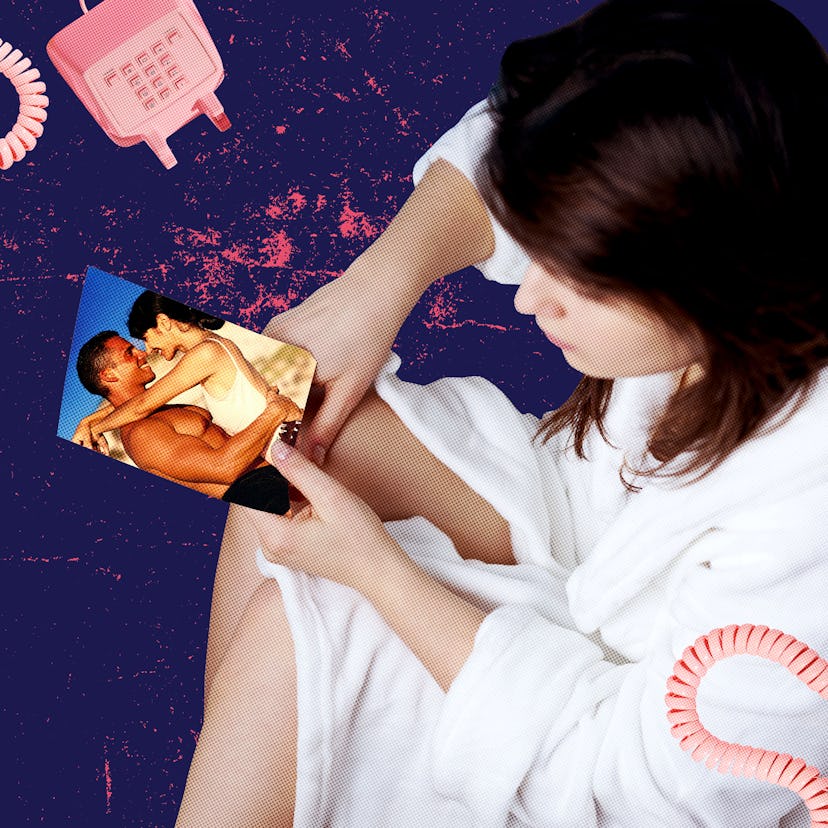My Husband Has Let Himself Go & It's Bad
He’s not the man I married, and I desperately want the old version back.


Welcome to Ask A MWLTF (Yes, that’s Mother Who Likes to F*ck.), a monthly anonymous advice column from Scary Mommy. Here we’ll dissect all your burning questions about motherhood, sex, romance, intimacy, and friendship with the help of our columnist, Penelope, a writer and mental health practitioner in training. She’ll dish out her most sound advice for parents on the delicate dance of raising kids without sacrificing other important relationships. Email her at askpenelope@scarymommy.com.
Dear MWLTF,
I'm a fit and attractive (for 46, I think) mom of four mostly grown kids. Two are still at home and in high school. My husband and I met in college, where we were both athletes. Physical fitness and wellness has always been a priority for me.
DH was always a big guy; 6 feet 3 inches and 230 lbs. of lean muscle in his prime. Over the years he’s worked out less but hasn’t changed his diet, and with the stress of his last job ballooned to over 300 lbs.
This is problematic on so many levels. Most importantly, he has been diagnosed with congestive heart failure at age 45, and spent a week in the hospital and two months in cardiac rehab. He's now on multiple medications that he must take daily. He has severe sleep apnea caused by his obesity and has to sleep with a CPAP machine. None of his clothes fit properly because he refuses to buy new ones, insisting his old clothes will fit when he loses the weight. With his heart condition, he is supposed to limit salt and alcohol, which he does NOT do. In the evenings he sits in front of the TV with a cocktail, and makes multiple trips to the kitchen for snacks — chips and salsa, cheese and crackers, a big handful of chocolate-covered almonds.
And his weight has really affected our sex life. I find myself physically repulsed by his obesity, and sex hasn't been satisfying for years. His size makes it really hard to do the things that used to get me off. If I'm on top, his belly is in the way of getting good penetration; if he's on top I'm being smothered. When we are intimate, which isn't often, maybe once every couple weeks, we do it from behind so I don't have to look at him. I'm not into toys — I feel like they would become a crutch to further enable him to not make any changes. Sex has become a chore I endure so he doesn't pout that we don't "do it" enough, which he does. I can't remember the last time I had an orgasm with him. I go to bed earlier than he does and pretend to be asleep so he leaves me alone. I get up early before he does to go work out, so there's no opportunity for pre-dawn sex.
I have asked him repeatedly to speak to his doctor about options like GLP1s or semaglutide, but insurance won't cover it and $1,000 a month is not something we can afford. He walks the dog but does very little other exercise. I cook healthy meals and fill our fridge and pantry with healthy food, but he just goes shopping on the side for things he wants that I don't buy, like potato chips, and other processed food like Twinkies or Cheez-Its.
Our kids have gotten used to this version of him, and the two at home seem to be following his "eat what you want and don't bother to work out" attitude. Both are overweight, and it's affecting their own abilities and performance in the sports they love to play. I am constantly trying to lead by example, but I can't scrutinize every food choice my daughter makes, for fear of hurting our relationship or inducing an eating disorder. I worry they will continue down his path into adulthood and end up with heart problems at a young age as well. I don't want to outlive my kids.
I find myself so angry at him. Why does he care so little about his life, his future, OUR future? Where is his self control? If this doesn't change he will be dead in five years and I will be left to start over in my 50s. Our kids will be without a dad, they will grow up and leave home and I will be alone. I feel like he's being selfish. I do LOVE him, and I don't want to leave him. But I want the old him back. I have asked him to go to therapy, he just says he doesn't need it, he just needs motivation to do the right thing. I have offered to go with him for couples therapy. He has no interest.
He has left the stressful job and has a much better one now, but he's been at the new one for three years and still nothing has changed. What can I do about this? Is an ultimatum my only option? Tell him I'll leave him if he doesn't get his shit together? I want to find my husband attractive again; I want to enjoy sex again. I want him to be the person we need him to be. And I don't want to grow old alone.
Please tell me what to do. All my friends just shrug their shoulders and say "that's rough, I wish I had some advice." All their husbands are if not super fit, at least not morbidly obese.
Help, I'm stuck.
Anonymous
Dear Stuck,
First, you're not shallow. You're not selfish. You're not cruel. You're a woman trying to hold together a life, a partnership, and a family, while your own needs are going unmet in every corner —emotional, physical, sexual, and practical. That’s hard. It’s understandable that you would come to see your husband’s weight as the source of all your frustration and disappointment. Your story, though, is about much more than weight or attraction. It's about grief. You’re grieving the man you fell in love with, the intimacy you shared, and the vision of your life you thought you'd grow into together. What you're facing is a slow erosion of that dream. It’s also about responsibility and commitment. Before I address those issues, however, it seems important to tease out an assumption at the center of your lament. Your anger at your husband, your belief that he is to blame for the strain that his obesity puts on his health, your relationship, and your family — or to put it succinctly, the belief that fat people are to blame for their fatness and would quickly slim down if they’d only be less lazy and glutenous — is an old one that has pervaded every corner of our culture. It’s an assumption that lay at the foundation of fat-shaming, not to mention a multi-billion dollar diet and fitness industry. Unfortunately for those industries, it’s an assumption that the latest science, including the science around the GLP-1 inhibitors you mention — is proving false.
The new science emerging around obesity is that far from signifying a weak character or moral failing, it’s the physical manifestation of a complex and potentially fatal metabolic disease, a disease from which nearly half the population of the country suffers, and which is likely exacerbated by environmental factors such as the over-abundance of calorie-dense, hyper-processed foods. It’s a serious and for some, debilitating, health condition, which, miraculously now appears to be treatable by a new class of revolutionary, though still prohibitively expensive drugs.
The reason I feel it’s important to pause on this point before addressing the relationship issues you detail is that I can’t help but notice an undercurrent of real meanness and contempt in your query. You acknowledge the very real possibility that, if left untreated, your husband may suffer serious health complications and an early death, but you then go on to describe him as “physically repulsive,” offering graphic detail about how his belly looks to you during penetration. You describe sex with him as “a chore,” seem to feel no guilt about your efforts to avoid being close to him, and take a tone of condescension around your own superior diet and exercise habits. Finally, and perhaps most perplexingly, you scoff at the idea of paying $1,000 per month for a treatment that may vastly improve your husband’s health and lifespan, insinuating, perhaps, that you shouldn’t have to shell out money for something he could manage if he only had more willpower. You claim that you love your husband, but what comes across in your letter is not love or compassion, but contempt.
Imagine, for a moment, that your husband did not suffer from obesity but from a neurological disease that made it difficult for him to walk and required the use of a wheelchair. Or imagine he was diagnosed with a cancer that required appearance-altering chemotherapy. Such disease might certainly create barriers to physical attraction and sexual intimacy, but I suspect your tone in describing these frustrations would be far less angry and contemptuous — emotions which are certainly not helpful when it comes to re-building intimacy. So my first piece of advice would be to educate yourself about the science of obesity and to replace your posture of shaming and blaming with one of problem-solving and collaboration.
All that said, beneath the hostility, I do think you raise a genuine and important question about what married people can do when ailments, injuries, or long-term health conditions transform the person with whom we’ve made a commitment into a less attractive or suitable sex partner. Some couples in this situations might explore consensual non-monogamy in its various forms, seek the help of a sex therapist, or explore new, non-penetrative forms of physical intimacy. Others might arrive at the difficult decision that physical intimacy with their chosen partner is no longer possible, and look to find ways to exit the relationship.
Whichever tack you take, it should include a reckoning with the fact that you can’t control what your husband eats or whether he exercises or how he uses his CPAP or what snacks he buys. Pull your energy back and put it toward your own joy, vitality, and peace. That doesn’t mean you give up on supporting efforts he makes towards managing his obesity. It means you stop draining yourself in an effort.
Most importantly, remember that obesity doesn’t change the fact that you deserve pleasure. Desire. Orgasm. Intimacy. Even if it’s solo for now. Even if it’s not with him. You’re allowed to have a sexual self, even if your partner isn’t meeting you there. Touch yourself. Fantasize. Reconnect with what turns you on. It might feel strange at first, but reclaiming your erotic self is a vital act of defiance against the numbness you’ve been stuck in.